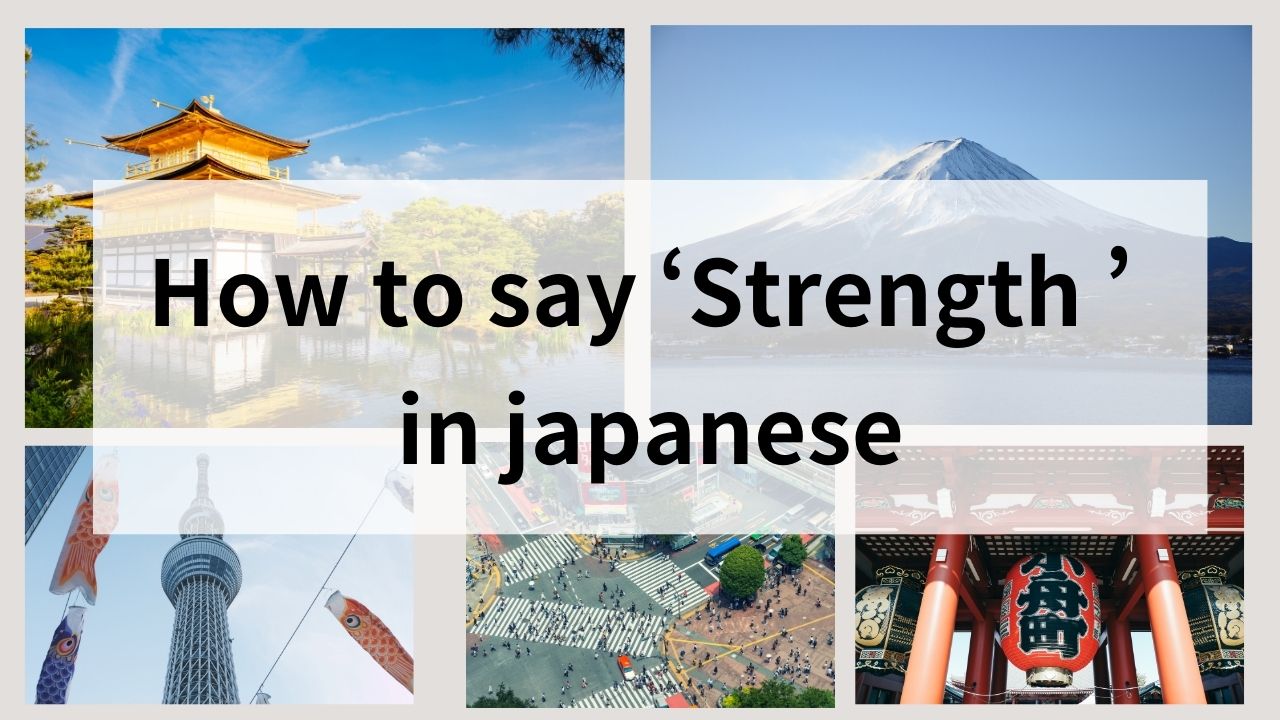Are you curious about how to express “strength” in Japanese? The concept of strength encompasses various interpretations, from physical power to mental resilience and emotional fortitude. This guide will explore the Japanese word for “strength,” its cultural significance, and practical applications.
How Do You Say “Strength” in Japanese?
The Japanese word for “strength” is 強さ (tsuyosa). This term is commonly used in both casual and formal contexts to describe various forms of strength, including physical, emotional, and spiritual strength.
The Japanese Word for Strength: Tsuyosa (強さ)
“Tsuyosa” is a versatile term that can be applied in different contexts. For example:
- 身体の強さ (Karada no tsuyosa): “Physical strength.”
- 精神的な強さ (Seishinteki na tsuyosa): “Mental strength.”
- 感情の強さ (Kanjou no tsuyosa): “Emotional strength.”
Kanji for Strength: 強
The kanji for strength, 強, is frequently used in literature, everyday language, and various compound words. This character embodies the essence of strength and power. The primary reading for this kanji is つよい (tsuyoi), which means “strong.” It can also be read as きょう (kyou) in certain contexts, such as in the word 強力 (kyouryoku), meaning “powerful.”
Examples of words that include the kanji 強 are:
- 強風 (kyoufu): “Strong wind.”
- 強化 (kyouka): “Strengthening,” often used in contexts like training or enhancing skills.
- 強敵 (kyouteki): “Strong enemy,” used to refer to formidable opponents.
This kanji is often associated with concepts related to strength, power, and resilience. Recognizing these patterns can aid learners in understanding the nuanced use of 強 in Japanese.
Does “Strength” Work in Japanese?
The English word “strength” is generally understood in Japan, especially among younger generations or those familiar with fitness and modern contexts. However, its recognition might be less universal among older individuals or in more traditional settings. A 5-point scale rates its comprehension as:
- Rating: 4 – Generally understood (60-80% of people)
If clarity is crucial, using the Japanese term 強さ (tsuyosa) is recommended. While “strength” may be understood in certain contexts, “tsuyosa” ensures effective communication.
The Cultural Significance of Strength in Japan
Strength holds a multifaceted importance in Japanese culture, symbolizing not only physical power but also mental resilience and emotional stability. It is often associated with traditional values such as perseverance, honor, and the ability to withstand adversity.
Strength as a Symbol of Resilience
In Japanese culture, resilience is highly valued. The concept of 頑張り (ganbari), which means to persevere or do your best, embodies the idea of strength in overcoming challenges. This cultural emphasis on resilience is reflected in various aspects of life, from personal struggles to national identity.
Strength in Japanese Folklore and Mythology
Strength appears in various Japanese myths and stories, often represented through legendary heroes and deities. These figures are typically characterized by their physical might as well as their moral integrity, emphasizing the balance between power and responsibility.
In modern Japanese pop culture, strength continues to play a significant role in storytelling, particularly in anime and manga. Characters often embody various forms of strength, from physical prowess to emotional growth.
- Dragon Ball: Goku’s journey revolves around not only physical strength but also personal growth and determination.
- Naruto: The character Naruto Uzumaki showcases resilience and emotional strength as he overcomes personal and societal challenges.
- Attack on Titan: Characters explore themes of strength and sacrifice in the face of overwhelming odds.
These examples illustrate how strength is interwoven with themes of perseverance and moral character in both traditional and contemporary narratives.
Differences Between Strength in Japan and Overseas
There can be subtle differences in how “strength” is perceived in Japan versus Western cultures. In Japan, strength often emphasizes emotional resilience and the ability to endure hardships, whereas Western contexts may focus more on physical power and assertiveness. Understanding these cultural nuances can help avoid misunderstandings, especially in discussions about personal attributes or values.
Practical Applications of “Strength” in Japanese
Learning how “strength” is used in Japanese can help you navigate conversations, understand idioms, and recognize its presence in Japanese culture.
Talking About Strength in Daily Conversation
Here are some examples of how “tsuyosa” is used in everyday conversation:
- 彼は強さを持っています (Kare wa tsuyosa o motteimasu): “He possesses strength.”
- その試練は強さを試します (Sono shiren wa tsuyosa o tameshimasu): “That trial tests your strength.”
Strength-Related Idioms or Expressions
Here are some idioms and expressions that incorporate the concept of strength:
- 強い意志 (Tsuyoi ishi): “Strong will,” referring to determination and resolve.
- 強靭な精神 (Kyoujin na seishin): “Resilient spirit,” describing someone who can withstand adversity.
- 強固な信念 (Kyouko na shinnen): “Strong belief,” indicating unwavering faith in one’s ideals.
These idioms reflect the cultural appreciation for strength in various forms, emphasizing qualities like determination, resilience, and conviction.
Strength in Japanese Cuisine or Products
Strength also manifests in Japanese cuisine, particularly in dishes that highlight health benefits, such as:
- 納豆 (Natto): Fermented soybeans known for their health benefits, often regarded as a “strength food” due to their high protein content.
- 黒豆 (Kuromame): Black soybeans are believed to promote health and longevity, often served during New Year celebrations.
- 海藻 (Kaiso): Seaweed is rich in nutrients and is considered a staple for maintaining overall strength and health.
These examples highlight how strength is associated with health and well-being in Japanese cuisine, showcasing the cultural significance of food as a source of vitality.
FAQs
Here are some frequently asked questions about strength in Japanese culture and language.
Is Strength a Valued Trait in Japan?
Yes, strength is a highly valued trait in Japan, encompassing not only physical power but also mental resilience and emotional stability. It is often associated with perseverance and honor.
How Do You Write “Strength” in Japanese?
The word “strength” can be written in three different scripts in Japanese: hiragana, katakana, and kanji. Each script serves different purposes depending on the context and formality. Here’s a breakdown:
- Hiragana (つよさ, tsuyosa):
Hiragana is the most commonly used script for “strength” in casual writing or when teaching children. It is simple and easy to read, making it ideal for everyday use. - Katakana (ツヨサ, tsuyosa):
Katakana is rarely used for “strength,” but it may appear in stylistic contexts, such as advertisements or product names. - Kanji (強さ, tsuyosa):
Kanji is the most formal way to write “strength,” often used in literature, official documents, and cultural contexts. The kanji itself conveys a sense of power and resilience.
Choosing which script to use depends on the tone, audience, and purpose of your communication. Understanding these variations can enhance both your written and spoken Japanese skills.
Conclusion
“Strength,” or “tsuyosa” in Japanese, embodies a rich cultural significance that goes beyond mere physical power. By understanding its role in Japanese language and traditions, you can deepen your appreciation for this essential concept and its connection to resilience, determination, and vitality in Japanese society.








